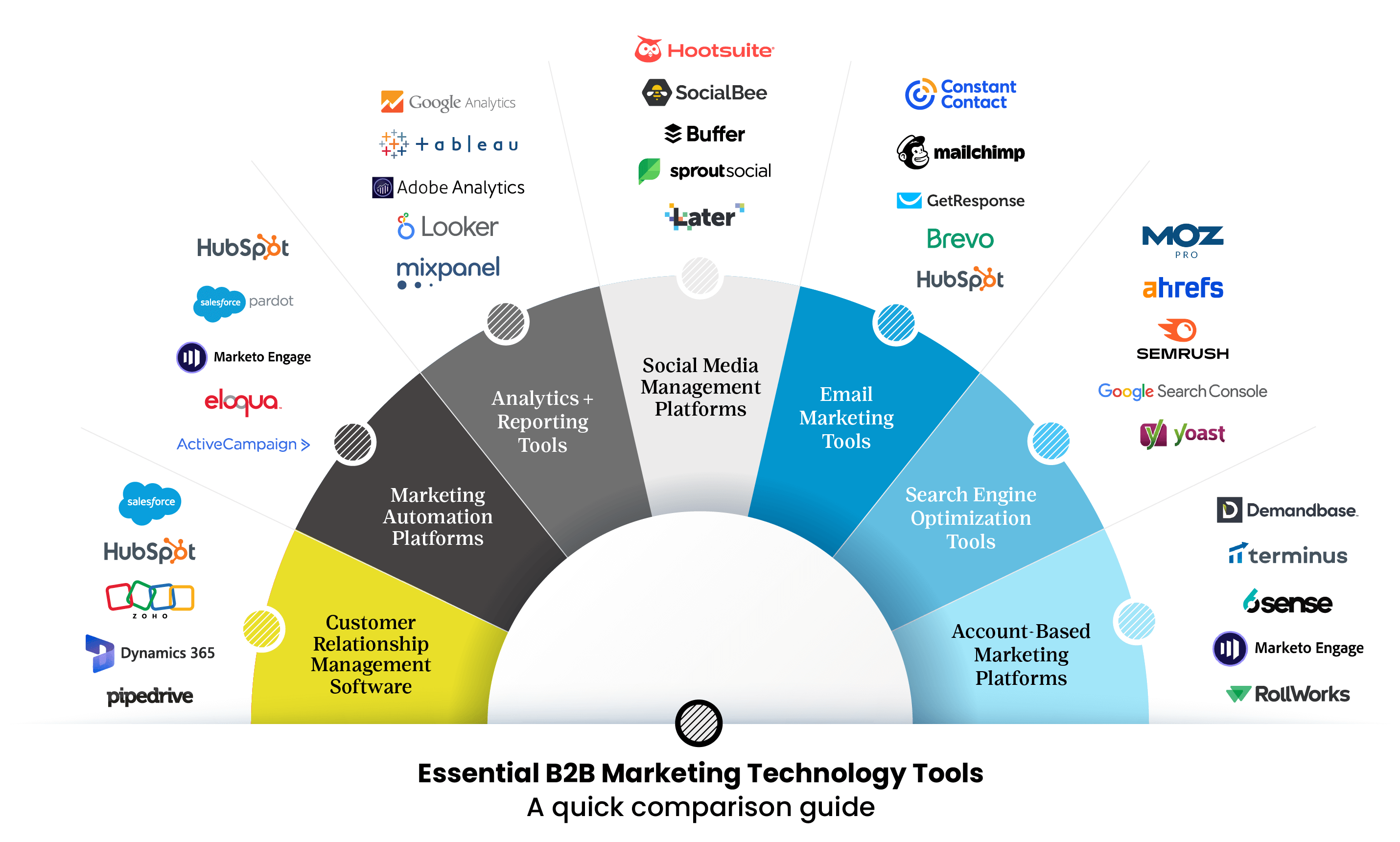When it comes to B2B marketing, it’s usually the flashy stuff that grabs all the attention: The animated marketing campaigns on digital channels. The hero video on your company’s homepage. The engaging content marketing strategy that keeps leads moving through the sales funnel.
What is a B2B marketing tech stack?
01
Customer relationship management (CRM) software
What role can customer relationship management software play in an effective B2B marketing tech stack? According to recent data from Salesforce, CRM systems can increase sales by up to 29% and improve sales forecasting accuracy by 42%. Those are stats that should pique the interest of both your marketing and sales teams.
Today, CRM software solutions like Salesforce and Hubspot are the cornerstone of any high-performing B2B marketing and sales engine and are essential for managing customer data, tracking leads and nurturing customer relationships. CRM tools allow you to maintain a centralized database of all customer interactions, which enables more personalized communication and efficient follow-up across marketing channels. By leveraging customer relationship management software, you can gain valuable insights into customer behavior, preferences and needs that lead to more effective marketing strategies.
02
Marketing automation platforms
Proven content management systems — such as HubSpot, Marketo and Pardot — allow your marketing team to automate repetitive tasks such as email marketing, lead scoring and campaign management and thereby improve the overall efficiency of your sales and marketing efforts. According to HubSpot’s latest data, companies that use marketing automation see a 451% increase in qualified leads.
With a marketing automation platform in place, you can streamline workflows, ensuring that leads are nurtured through the sales funnel efficiently. With features like automated email sequences, lead scoring and personalized content delivery, you can focus on high-value activities while ensuring consistent engagement with your target audience.
03
Analytics and reporting tools
Analytics and reporting tools are your eyes and ears, providing insights into web traffic, user behavior and B2B marketing campaign performance. According to Econsultancy, companies that leverage web analytics are 5.2 times more likely to outperform their competitors.
Whether you’re using free tools like Google Analytics or more robust options like Adobe Analytics and Tableau, these platforms offer the data you need to make data-driven decisions, identify trends and measure the ROI of your B2B marketing efforts. That data leads to more effective digital marketing strategies and better results.
04
SOCIAL MEDIA MANAGEMENT PLATFORMS
Given that 75% of B2B buyers use social media to support their purchase decisions, having social media marketing tools to manage your social media posts is crucial. If you have a robust social media presence, consider using a specialized tool, like Hootsuite or Sprout Social, to help schedule posts, engage with followers and analyze performance. Another option is using social media tools within your CRM system. (HubSpot’s tool is pretty solid and is getting better every year.)
Regardless of what direction you choose, these social media platforms can help you maintain a consistent presence, monitor brand mentions and engage with your audience in real time. Plus, these tools offer analytics features that provide insights into the effectiveness of social media campaigns, helping you refine your strategies and improve engagement.
05
Email marketing tools
Email marketing isn’t going anywhere; it’s still one of the most effective channels for reaching B2B audiences, with an ROI of between $35 and $40 for every dollar spent.
Popular tools — like HubSpot, Mailchimp and Constant Contact — allow marketing teams to easily create, distribute and analyze email campaigns. These solutions also provide templates, automation features and detailed analytics to track open rates, click-through rates and conversions. By leveraging email marketing tools, you can deliver targeted, personalized content to your audience, nurture leads and drive conversions.
06
Search engine optimization (SEO) tools
If your website isn’t showing up in search engine rankings, you’re missing out. Since 93% of online experiences begin with search engines, having a strong search engine optimization (SEO) strategy is essential for B2B marketing success.
SEO tools to add to your marketing tech stack, such as Semrush and Moz, help improve your website’s search performance, conduct keyword research and track organic search rankings. These analytics tools also provide insights into keyword performance, competitor analysis and backlink tracking — enabling you to optimize your content, outrank your competitors and attract the kind of traffic that turns into leads.
07
Account-based marketing (ABM) platforms
When you’re targeting high-value accounts, you need marketing strategies that are laser-focused and efficiently move prospects through the sales pipeline. That’s where ABM platforms, like Demandbase and 6sense, come into play. These marketing tools help you identify, engage and convert key accounts through personalized marketing messages throughout the customer journey.
ABM has proven to be highly effective, with 76% of B2B marketers reporting higher ROI compared to other marketing efforts. With ABM platforms, you can tailor your messaging and marketing campaigns to specific accounts, allowing you and your sales and marketing teams to build stronger relationships with key prospects, accelerate the sales cycle and drive revenue growth.
On the horizon: marketing technology trends
As the B2B marketing technology landscape keeps evolving, staying ahead of the game means not just having the right marketing tech tools, but also keeping an eye on the trends shaping the future of marketing operations.
Here are a few marketing tech stack trends to consider:
- Tech stack integration. In recent years, the focus has shifted toward integrating various tools within your B2B marketing tech stack to ensure seamless operations and data flow across platforms, allowing for a more cohesive marketing strategy.
- AI and automation. AI continues to revolutionize B2B marketing. Tools that leverage AI can help marketers predict customer behavior, automate repetitive tasks and deliver highly targeted content.
- Data privacy concerns. Tools that enhance data security and ensure compliance with privacy regulations are becoming critical components of the marketing tech stack.
- No-code platforms. These innovation solutions are gaining traction as they allow marketers to build and customize digital solutions without needing extensive technical expertise.

Ready to get started?



